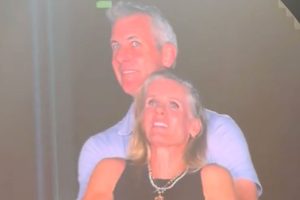Naimah Hassan can summarize how she met her husband in one simple sentence. She was at a jazz club in New York, he worked the door, eventually they got married. Steve Epstein, on the other hand, tells a different tale.
“She didn’t tell you the whole thing,” said Epstein, who’s been married to Hassan, a black woman, for 27 years. “When you work the door, people never wanted to pay the cover charge. She told me she was black, and since it’s black music, she shouldn’t have to pay.”
Not surprisingly, Hassan’s tactics didn’t work.
“I made her pay. And she did come back and baked me cookies. As a form of a bribe. I’m very tough. I still made her pay,” Epstein said. “Once we got married, she got in for free.”
Both Hassan’s ethnicity and Epstein’s Jewish background are essential to the couple’s story. So essential, in fact, that the two decided to base a comedy show around it. About 12 years into their marriage, Epstein and Hassan became a comedy duo known as the Black and the Jew. Their performances focused on something called black/Jew/love technology.
“It’s a technology that improves relationships,” Hassan explained.
“We had been married 12 years. We realized even though we had no money, we lived in a small apartment, our marriage was very successful,” Epstein added. “Many of our friends who had big cars, lots of money, their marriages were failing. We decided to give advice.”
The two, who are based in New York, decided to take their advice north of the border and will be performing at the Toronto Fringe Festival until July 12 in a show called, appropriately, She’s Black, He’s Jewish, They’re Married, Oy Vey.
“We’re teaching people if a black and a Jew can find love, there’s hope for everybody in the world,” Epstein said.
The two added that their performances are like mock workshops that cover everything from how to take control of your own wedding to how to keep a relationship strong while taking care of a sick parent.
And, of course, sex is covered as well.
“We teach people what you can and cannot say during interracial sex,” quipped Epstein.
The show is 18 plus, after all.
Epstein admits that their shows get a mixed reaction from the Jewish community.
“We always tell people our show is about a mind set,” Epstein said. “Some Jews love that, some Jews don’t.”
“We’re celebrating inclusion,” Hassan added. “Not to become the other. Not to disown what you are. But to include.”
Beneath the comedy, the show has an important message.
“Love will concur all. If you’re the kind of person that doesn’t believe that, then you’re going to have some discomfort with the show,” Epstein said.
While the two admit being an interracial couple has gotten easier in the past 27 years, they still face prejudice.
“The racism in the United States is the worst it’s ever been since I have been around,” Epstein said. “It’s a very challenging thing to be an interracial couple in America. We were in Harlem and a guy yelled at Naimah for dating a black man.”
Epstein and Hassan’s relationship wasn’t always easy for their families to understand either. Epstein’s parents “grew up basically in a Jewish ghetto,” he said. “(My mother) had a hard time handling our marriage. When we decided to get married in the beginning, my mother said that what Hitler was not able to do, Jewish kids are doing to themselves.”
Eventually, Epstein’s mother changed her mind.
“Over time she realized we had a lot of love in our marriage,” he said.
Hassan’s father was also skeptical of the union.
“My father could not believe I was marrying a Jew with no money. He was like, ‘All Jews have money. Check their shoes,’” Hassan said. “We started off like that. Both of our parents being protective, not understanding. Through the years, they were our biggest supporters. They came to our shows.”
For more info on She’s Black, He’s Jewish, They’re Married, Oy Vey, visit fringetoronto.com/fringe-festival/shows/shes-black-hes-jewish-theyre-married-oy-vey.






